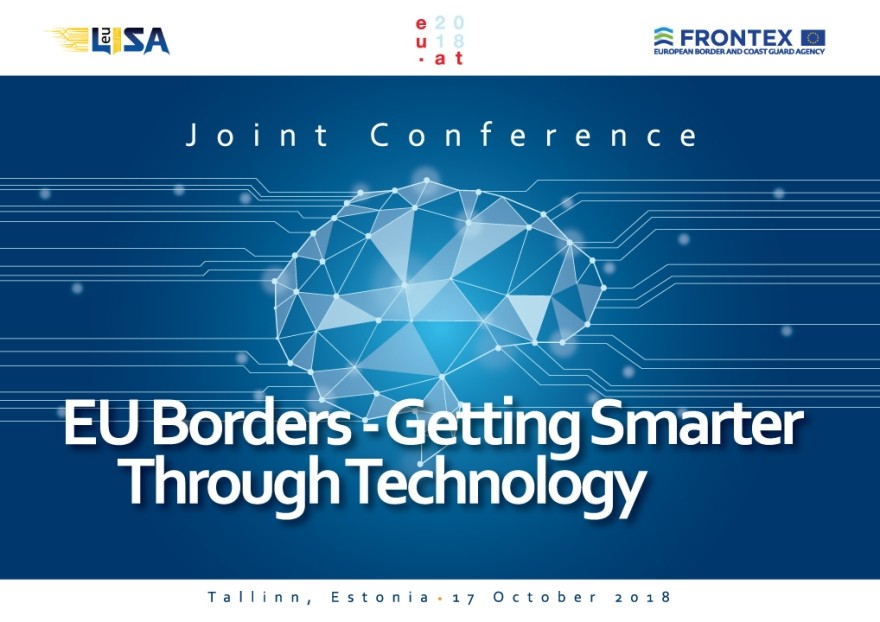Actions

On 17 October 2018 eu-LISA (the European Agency for the operational management of large-scale IT systems in the area of freedom, security and justice) and Frontex (the European Border and Coast Guard Agency) will co-host the conference "EU Borders - Getting Smarter Through Technology" in Tallinn, Estonia. The event is organised under the auspices of the Austrian Presidency of the Council of the EU. The conference will focus on new trends, technologies and challenges in external border management, both from strategic and operational points of view. The conference will bring together some 180 delegates representing Member States, EU institutions and agencies, practitioners and industry.
EU border management authorities have faced increasing challenges in recent years. Crime continues to be more international than ever, placing pressure on border authorities to step up checks in order to detect illicit activities; terrorist attacks have taken place on the territory of the EU that have involved sometimes extensive cross-border travel during preparations; some of the most vulnerable in our society continue to fall victim to human trafficking. Such challenges present at the same time as the flux across borders increases due to trade, business, work and travel.
Technology is increasingly seen as a vital means to deal with the increasing demands on border authorities. In the coming years, at least two new large-scale IT systems will be developed and implemented - the European Entry-Exit System (EES) and the European Travel Information and Authorisation System (ETIAS). Both systems seek to render border checks more comprehensive but at the same time more efficient. The systems will, inter alia, involve the use of biometric data to enable effective and rapid identity checks, the introduction of pre-travel authorisation processes to facilitate advance traveller processing and to remove some of the check burden from the first line border officer and the deployment of self-service technologies such as kiosks and Automated Border Control gates. eu-LISA is tasked with the technical development and implementation of both.
"Today, we face a transformation of the Justice and Home affairs domain, leading to a rapid convergence between border management, internal security and migration management from an operational and a policy point of view. We can no longer draw border lines between them. At the same time, the impact of the ongoing digital revolution will continue and even accelerate in the coming years. Therefore, the EU should continue to further explore the capabilities of technology to make border management, internal security and migration management stronger and smarter.
Although this all may sound too technological, if not technocratic, then I can assure you that in fact it is all about people. It's about how to best meet the expectations of EU citizens who are worried about terrorist threats, concerned with internal security as well as migration and expect our shared values, the values on which the EU has been built, to be translated into practical solutions and results.", said Krum Garkov, Executive Director of eu-LISA.
Undoubtedly, use of these systems implies significant change in border control processes. Efficiencies will only become apparent if the systems are appropriately utilised, technologies appropriately leveraged and border guards fully trained to deal with all eventualities. Engagement with the border guard community to enable their anticipation of future developments and their input during their development process will be key. eu-LISA and Frontex, the European Border and Coast Guard Agency, will therefore be working closely together throughout.
"In order to effectively address the double challenge of increased travel and greater security needs, it is imperative we harness the power of transformation that innovative new technologies can offer," said Frontex Executive Director Fabrice Leggeri. "Our discussions today centre on precisely those sophisticated systems that will help bona fide travellers enter the EU, while detecting those who represent a threat to our security upstream in order to take appropriate action."
Mike Flander, Head of Unit at the Austrian Federal Ministry of Interior, states that "EU Borders – Getting Smarter Through Technology means Interoperability and means having the right information at the right time at the right place in a secure, reliable and trustworthy manner."
Keynote speakers also include Olivier Onidi, Deputy Director General of the Directorate-General Migration and Home Affairs, European Commission. Experts from EU Agencies as well as from the public and private sectors of several countries worldwide will share their knowledge and expertise.
Online web-streaming will be provided during the conference at www.eulisaconference.eu/streaming and a Twitter-wall will be available to enable interactive participation from all locations.